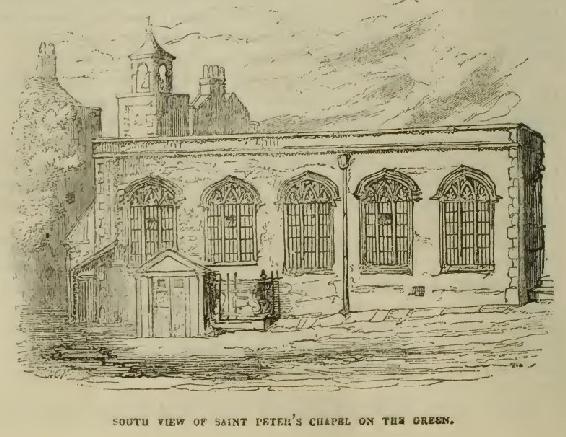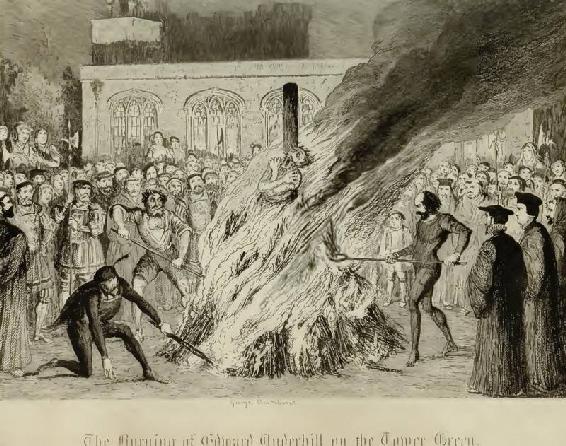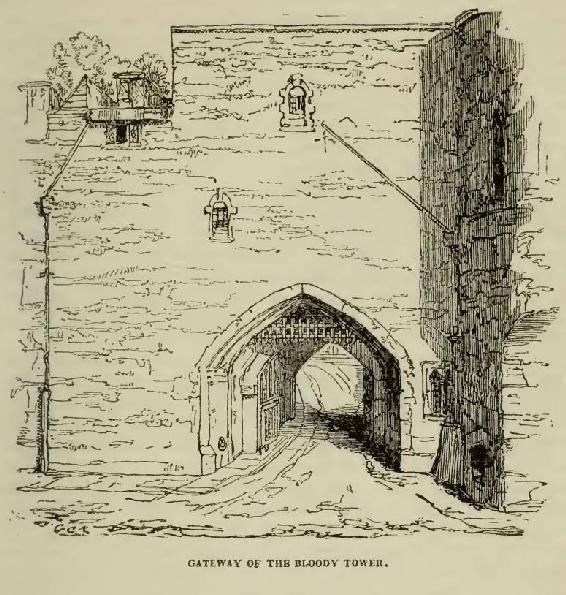
It was the policy of the Romish priesthood, at the commencement of Mary’s reign, to win, by whatever means, as many converts as possible to their church. With this view, Gardiner, by the queen’s desire, offered a free pardon to the Hot-Gospeller, provided he would publicly abjure his errors, and embrace the Catholic faith; well knowing, that as general attention had been drawn to his crime, and strong sympathy was excited on account of his doctrines, notwithstanding the heinous nature of his offence, among the Protestant party, that his recantation would be far more available to their cause than his execution. But the enthusiast rejected the offer with disdain. Worn down by suffering, crippled with torture, his spirit still burnt fiercely as ever. And the only answer that could be wrung from him by his tormentors was, that he lamented his design had failed, and rejoiced he should seal his faith with his blood.
On one occasion, he was visited in his cell by Bonner, who desired that the heavy irons with which he was loaded should be removed, and a cup of wine given him. Underhill refused to taste the beverage, but Nightgall and Wolfytt, who were present, forced him to swallow it. A brief conference then took place between the bishop and the prisoner, wherein the former strove earnestly to persuade him to recant. But Underhill was so firm in his purpose, and so violent in his denunciations against his interrogator, that Bonner lost all patience, and cried, “If my words do not affright thee, thou vile traitor and pestilent heretic, yet shall the fire to which I will deliver thee.”
“There thou art mistaken, thou false teacher of a false doctrine,” rejoined Underhill sternly. “The fire may consume my body, but it hath no power over my mind, which shall remain as unscathed as the three children of Israel, Shadrach, Meshach, and Abed-nego, when they stood in the midst of the fiery furnace. For as the apostle saith—‘The fire shall try every man’s work what it is. If any man’s work, that he hath builded upon, abide, he shall receive a reward. If any man’s work burn, he shall suffer loss. But he shall be saved himself, nevertheless, yet as it were through fire.’ Even so shall I, despite my manifold transgressions, be saved: while ye, idolatrous priests and prophets of Baal, shall be consumed in everlasting flames.”
“Go to,—go to, thou foolish boaster,” retorted Bonner angrily; “a season will come when thou wilt bitterly lament thou hast turned aside the merciful intentions of thy judges.”
“I have already said that the fire has no terrors for me,” replied Underhill. “When the spirit has once asserted its superiority over the flesh, the body can feel no pain. Upon the rack—in that dreadful engine, which fixes the frame in such a posture that no limb or joint can move—I was at ease. And to prove that I have no sense of suffering, I will myself administer the torture.”
So saying, and raising with some difficulty his stiffened arm, he held his hand over the flame of a lamp that stood upon the table before him, until the veins shrunk and burst, and the sinews cracked. During this dreadful trial, his countenance underwent no change. And if Bonner had not withdrawn the lamp, he would have allowed the limb to be entirely consumed.
“Peradventure, thou wilt believe me now,” he cried triumphantly; “and wilt understand that the Lord will so strengthen me with his holy spirit that I may be ‘one of the number of those blessed, which, enduring to the end, shall reap a heavenly inheritance.’”
“Take him away,” replied Bonner. “His blood be upon his own head. He is so blinded and besotted, that he does not perceive that his death will lead to damnation.”
“No, verily,” rejoined Underhill, exultingly; “for as Saint Paul saith, There is no damnation to them that are in Christ Jesus, which walk not after the flesh, but after the spirit. Death, where is thy sting? Hell, where is thy victory?”
“Hence with the blasphemer,” roared Bonner; “and spare him no torments, for he deserves the severest ye can inflict.”
Upon this, Underhill was removed, and the bishop’s injunctions in respect to the torture literally fulfilled.
Brought to trial for the attempt upon the queen’s life, he was found guilty, and received the royal pardon. Nothing could be elicited as to his having any associates or instigators to his crime. And the only matter that implicated another was the prayer for the restoration of Jane, written in a leaf of the bible found upon his person at the time of his seizure. But though he was pardoned by Mary, he did not escape. He was claimed as a heretic by Bonner; examined before the ecclesiastical commissioners; and adjudged to the stake. The warrant for his execution was signed, as above related, by the queen.
On the night before this terrible sentence was carried into effect, he was robed in a loose dress of flame-coloured taffeta, and conveyed through the secret passages to Saint John’s Chapel in the White Tower, which was brilliantly illuminated, and filled with a large assemblage. As he entered the sacred structure, a priest advanced with holy water, but he turned aside with a scornful look. Another, more officious, placed a consecrated wafer to his lips, but he spat it out; while a third forced a couple of tapers into his hands, which he was compelled to carry, in this way, he was led along the aisle by his guard, through the crowd of spectators who divided as he moved towards the altar, before which, as on the occasion of the Duke of Northumberland’s reconciliation, Gardiner was seated upon the faldstool, with the mitre on his head. Priests and choristers were arranged on either side in their full habits. The aspect of the chancellor-bishop was stern and menacing, but the miserable enthusiast did not quail before it. On the contrary, he seemed inspired with new strength; and though he had with difficulty dragged his crippled limbs along the dark passages, he now stood firm and erect. His limbs were wasted, his cheeks hollow, his eyes deep sunken in their sockets, but flashing with vivid lustre. At a gesture from Gardiner, Nightgall and Wolfytt, who attended him, forced him upon his knees.
Edward Underhill, demanded the bishop, in a stern voice, “for the last time, I ask thee dost thou persist in thy impious and damnable heresies?”
“I persist in my adherence to the Protestant faith, by which alone I can be saved,” replied Underhill, firmly. “I deserve and desire death for having raised my hand against the queens life. But as her highness has been graciously pleased to extend her mercy towards me, if I suffer death it will be in the cause of the gospel. And I take all here present to witness that I am right willing to do so, certain that I shall obtain by such means the crown of everlasting life. I would suffer a thousand deaths—yea all the rackings, torments, crucifyings, and other persecutions endured by the martyrs of old, rather than deny Christ and his gospel, or defile my faith and conscience with the false worship of the Romish religion.”
“Then perish in thy sins, unbeliever,” replied Gardiner sternly.
And he arose, and taking off his mitre, the whole assemblage knelt down, while the terrible denunciation of the Catholic church against a heretic was solemnly pronounced. This done, mass was performed, hymns were chanted, and the prisoner was conducted to his cell.
The brief remainder of his life was passed by Underhill in deep but silent devotion; for his jailors, who never left him, would not suffer him to pray aloud, or even to kneel; and strove, though vainly, to distract him, by singing ribald songs, plucking his beard and garments, and offering other interruptions.
The place appointed as the scene of his last earthly suffering was a square patch of ground, marked by a border of white flint stones, then, and even now, totally destitute of herbage, in front of Saint Peter’s Chapel on the Green, where the scaffold for those executed within the Tower was ordinarily erected, and where Anne Boleyn and Catherine Howard were beheaded.
On this spot a strong stake was driven deeply into the ground, and at a little distance from it was piled a large stack of fagots. An iron ring was fixed to the centre of the stake, and to the ring was attached a broad iron girdle, destined to encircle the body of the victim.
As night set in, a large band of halberdiers marched into the green, and stationed themselves round the stake. Long before this, sombre groups had gathered together at various points, and eyed the proceedings in moody silence. None of the curiosity—none of the excitement ordinarily manifested upon such occasions—was now exhibited. Underhills crime had checked the strong tide of sympathy which would otherwise have run in his favour. Still, as he had been pardoned by the queen, and was condemned for his religious opinions only, deep commiseration was felt for him. It was not, however, for him that the assemblage looked grave, but for themselves. Most of them were of the Reformed faith, and they argued—and with reason,—that this was only the commencement of a season of trouble; and that the next victim might be one of their own family. With such sentiments, it is not to be wondered at, that they looked on sternly and suspiciously, and with the strongest disposition—though it was not manifested, otherwise than by looks—to interrupt the proceedings. As it grew dark, and faces could no longer be discerned, loud murmurings arose, and it was deemed expedient to double the guard, and to place in custody some of the most clamorous. By this means, all disposition to tumult was checked, and profound silence ensued. Meanwhile, numbers continued to flock thither, until, long before the appointed hour arrived, the whole area from the lieutenant’s lodgings to Saint Peters Chapel was densely thronged.

As the bell ceased tolling the hour of midnight, a lugubrious procession slowly issued from beneath the gloomy archway of the Coalharbour Gate. First came four yeomen of the guard walking two and two, and bearing banners of black silk, displaying large white crosses. Then twelve deacons in the same order, in robes of black silk and flat caps, each carrying a long lighted wax taper. Then a priest’s assistant, in a white surplice, with a red cross in front, bareheaded, and swinging a large bell heavily to and fro. Then two young priests, likewise bareheaded, and in white surplices, each holding a lighted taper in a massive silver candlestick. Then an old priest with the mitre. Then two chantry-priests in their robes singing the Miserere. Then four Carmelite monks, each with a large rosary hanging from his wrist, supporting a richly gilt square canopy, decorated at each corner with a sculptured cross, beneath which walked Bonner, in his scarlet chimere and white rochet. Then came Feckenham and other prelates, followed by two more chantry-priests singing the same doleful hymn as their predecessors. Then came a long train of halberdiers. Then the prisoner, clothed in sackcloth and bare-footed, walking between two friars of the lowly order of Saint Francis, who besought him, in piteous tones, to repent ere it was too late. And lastly, the rear was brought up by a company of archers of the queen’s body guard.
As soon as the procession had formed in the order it arrived round the place of execution, the prisoner was brought forward by the two friars, who for the last time earnestly exhorted him to recant, and save his soul alive. But he pushed them from him, saying, “Get hence ye popish wolves! ye raveners of Christ’s faithful flock! Back to the idolatrous Antichrist of Rome who sent ye hither. I will have none of your detestable doctrines. Get hence, I say, and trouble me no more.”
When the friars drew back, he would have addressed the assemblage. But a halberdier, by Bonner’s command, thrust a pike into his mouth and silenced him. A wild and uncouth figure, with strong but clumsily-formed limbs, coarse repulsive features, lighted up by a savage smile, now stepped forward. It was Wolfytt, the sworn tormentor. He was attired in a jerkin and hose of tawny leather. His arms and chest were bare, and covered with a thick pile of red hair. His ragged locks and beard, of the same disgusting colour, added to his hideous and revolting appearance. He was armed with a long iron pitchfork, and had a large hammer and a pair of pincers stuck in his girdle. Behind him came Mauger and Nightgall.
A deep and awful silence now prevailed throughout the concourse. Not a breath was drawn, and every eye was bent upon the victim. He was seized and stripped by Mauger and Wolfytt, the latter of whom dragged him to the stake, which the poor zealot reverently kissed as he reached it, placed the iron girdle round his waist, and riveted it to the post. In this position, Underhill cried with a loud voice, “God preserve Queen Jane! and speedily restore her to the throne, that she may deliver this unhappy realm from the popish idolaters who would utterly subvert it.”
Several voices cried “Amen!” and Wolfytt, who was nailing the girdle at the time, commanded him to keep silence, and enforced the order by striking him a severe blow on the temples with the hammer.
“You might have spared me that, friend,” observed Underhill, meekly. And he then added, in a lower tone, “Have mercy upon me, O Lord, for I am weak! O Lord heal me, for all my bones are vexed!”
While the fagots were heaped around him by Mauger and Nightgall, he continued to pray fervently; and when all was made ready, he cried, “Dear Father, I beseech thee to give once more to this realm the blessing of thy word, with godly peace. Purge and purify me by this fire in Christ’s death and passion through thy spirit, that I may be an acceptable burnt-offering in thy sight. Farewell, dear friends. Pray for me, and pray with me.”
As he spoke, Nightgall seized a torch and applied it to the fagots. His example was imitated by Mauger and Wolfytt, and the pile was speedily kindled. The dry wood crackled, and the smoke rose in thick volumes. the flames then burst forth, and burning fast and fiercely, cast a lurid light upon the countenances of the spectators, upon the windows of Saint Peter’s chapel, and upon the grey walls of the White Tower. As yet, the fire had not reached the victim; the wind blowing strongly from the west, carried it aside. But in a few seconds it gained sufficient ascendancy, and his sufferings commenced. For a short space, he endured them without a groan. But as the flames mounted, notwithstanding all his efforts, the sharpness of the torment overcame him. Placing his hands behind his neck, he made desperate attempts to draw himself further up the stake, out of the reach of the devouring element. But the iron girdle effectually restrained him. He then lost all command of himself; and his eyes starting from their sockets—his convulsed features—his erected hair, and writhing frame—proclaimed the extremity of his agony. He sought relief by adding to his own torture. Crossing his hands upon his breast, and grasping either shoulder, he plunged his nails deeply into the flesh. It was a horrible sight, and a shuddering groan burst from the assemblage. Fresh fagots were added by Nightgall and his companions, who moved around the pyre like fiends engaged in some impious rite. The flames again arose brightly and fiercely. By this time, the lower limbs were entirely consumed; and throwing back his head, and uttering a loud and lamentable yell which was heard all over the fortress, the wretched victim gave up the ghost. A deep and mournful silence succeeded this fearful cry. It found an heco in every breast.

